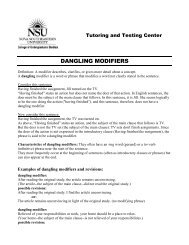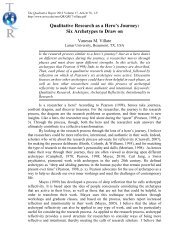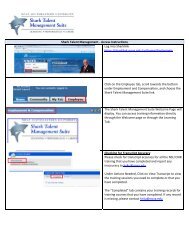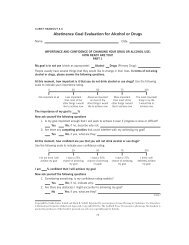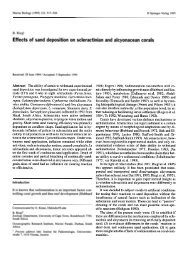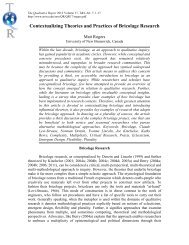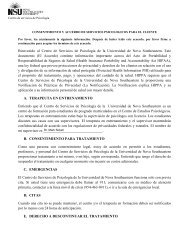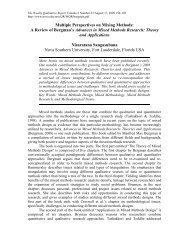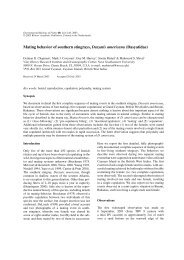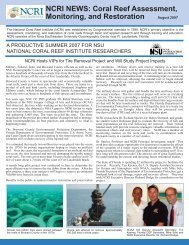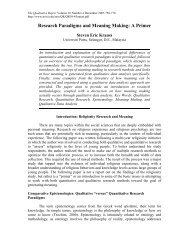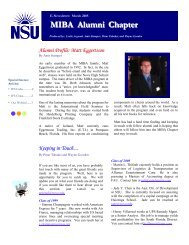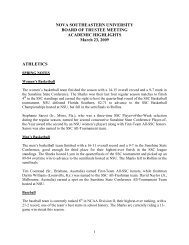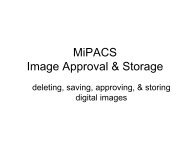11th ICRS Abstract book - Nova Southeastern University
11th ICRS Abstract book - Nova Southeastern University
11th ICRS Abstract book - Nova Southeastern University
Create successful ePaper yourself
Turn your PDF publications into a flip-book with our unique Google optimized e-Paper software.
23-21<br />
Fishery Management For Artisanal Reef Fisheries in Developing Countries: A<br />
Holistic Economic Approach<br />
Christopher LIESE* 1<br />
1 Social Science Research Group, SE Fisheries Science Center, National Marine Fishery<br />
Service, NOAA, Miami, FL<br />
This paper argues that traditionally exploited renewable resources in developing<br />
countries, in particular artisanal coral reef fisheries, are difficult or impossible to manage<br />
with classical fishery management tools. Further, given many special characteristics of<br />
these fisheries, even the usual policy objectives need to be questioned. By taking a closer<br />
look at the setting and the decisions that underlie the behavior of the fishing households,<br />
a different approach to management reveals itself. A set of policy options, based on a<br />
broader economic scale and new to the fisheries context, is more likely to be feasible and<br />
effective at conservation.<br />
The explicit treatment of household-level behaviors and market settings, in addition to<br />
selected social and demographic elements, adds important dimensions to the management<br />
problem. The combination of these economic, social and demographic forces largely<br />
determines fishing pressure and hence the biological health of the resource. In turn, the<br />
status of the resource profoundly affects human well-being. A collapse will create<br />
unemployment, worsen poverty and possibly lead to large population movements. As a<br />
result, governments must find ways to conserve these resources in an effective, practical<br />
and equitable manner.<br />
This paper tries to identify these second best solutions, i.e. feasible policies that might<br />
conserve the current health and potential of the resource in spite of it being exploited<br />
under an open access property rights regime. For instance, income diversification and<br />
alternative employment programs, usually an afterthought to conservation projects,<br />
should be reevaluated as primary tools for conservation. Further, long-term family<br />
planning policies and policies leading to poverty reduction are likely to have the greatest<br />
impact. The coral reef fishery of Minahasa, Indonesia serves as illustration throughout<br />
this paper.<br />
The views expressed herein are my own.<br />
23-22<br />
Coral Reef Resource Values, Trade and Sustainability<br />
Benjamin STARKHOUSE* 1 , Louise TEH 1 , Lydia TEH 1 , Yvonne SADOVY 2 , Rashid<br />
SUMAILA 1<br />
1 Fisheries Center, <strong>University</strong> of British Columbia, Vancouver, BC, Canada, 2 <strong>University</strong><br />
of Hong Kong, Hong Kong, Hong Kong<br />
Coral reef ecosystems are high in marine biodiversity, and are also significant socioeconomically<br />
as a source of food and income in many developing countries. Trade in<br />
coral reef resources brings up biological as well as social and economic issues. The<br />
removal of target species causes disturbances to the structure of the coral reef ecosystem.<br />
Increasing demand for trade products can lead to the depletion of many fish and<br />
invertebrate stocks, resulting in economic hardship for fishers who target these species<br />
for artisanal and subsistence purposes.<br />
First, we give an overview of our project on coral reef values, trade and sustainability.<br />
Second, we give details on the coral reef valuation component of our project. The<br />
objective being to examine the net benefit of coral reef resource export trade relative to<br />
the benefits from other uses of reef resources to the source country, here, Fiji. Although<br />
Fiji is selected for a case study, the outcomes are expected to have much broader<br />
application, especially to the island countries of the Pacific. Fiji relies on its coral reef<br />
ecosystems for food, tradable commodities and tourist dollars. Even though a substantial<br />
contributor to Fiji’s economy, a comprehensive, national-level valuation of the coral reef<br />
sector is nonexistent. We will present an in depth analysis of the socio-economics of<br />
Fiji’s coral reef resources. Our focus is on all reef-associated species harvested for food<br />
(finfish, invertebrates and plants), the marine aquarium industry, industrial and<br />
commercial uses of coral, reef products that are processed and/or exported, such as<br />
trochus shells, and coral reef related tourism such as diving, snorkeling and fishing. The<br />
results from this study will reveal the true direct use value of Fiji’s coral reefs and can<br />
assist resource managers in developing socio-economically sustainable coral reef<br />
resource use strategies.<br />
Oral Mini-Symposium 23: Reef Management<br />
23-23<br />
Coral Reef Reserves In Vanuatu; Ecological Vs. Socio-Cultural Impacts<br />
Christopher BARTLETT* 1 , Charley MANUA 2<br />
1 SEES, James Cook <strong>University</strong>, Townsville, Australia, 2 Nguna-Pele Marine Protected Area,<br />
Port Vila, Vanuatu<br />
This paper examines people’s perceptions of local social-ecological systems as influenced by<br />
the presence of community-based coral reef management initiatives in the Republic of Vanuatu.<br />
National and regional Melanesian characteristics, such as strong customary marine tenure and<br />
decentralized governance, are highlighted as integral to understand the existence of local marine<br />
reserves as well as to give context to historical marine resource use patterns. We assess humannature<br />
interactions and perceptions of marine resource levels and management of all individuals<br />
from six (6) small insular communities; three (3) with strong local management regimes, three<br />
(3) without. The research employs a comparative analytic methodology based on socio-cultural<br />
and ecological participatory research. We demonstrate that communities with the most robust<br />
local management regimes and long-term coral reef reserves, have significantly different<br />
average perceptions of the SES including stronger local governance, social cohesion,<br />
management responsibility and human agency. Results indicate that small-scale marine reserves<br />
and associated activities in insular Melanesia may have influence into village social and cultural<br />
realms that transcend intended ecological benefits. It will be intimated by the authors that these<br />
social and cultural impacts may be of the most valuable benefits of marine reserves to be gained<br />
by the SES in small Melanesian communities with extremely limited sea tenure areas. This<br />
thesis is discussed in light of the temporal and spatial scales necessary for effective<br />
management of coral reef ecological systems. We conclude that some small Melanesian marine<br />
reserves, combined with the village social and cultural attributes they enhance, significantly<br />
contribute to regional management capacity, thus enriching the marine reserve ‘effectiveness’<br />
debate<br />
23-24<br />
A Business Approach To Coral Reef Management: The Main Hawaiian Islands Seascape<br />
Strategy Model<br />
Melissa BOS* 1<br />
1 Conservation International, Honolulu, HI<br />
The frontier of coral reef management involves the application of business principles and tools<br />
to conservation planning and implementation. Many current management strategies are limited<br />
by reductionism and lack of financial planning. The Main Hawaiian Islands Seascape Strategy<br />
is an example of a holistic, business-like approach to marine resource conservation. In the<br />
business analogy, a conservation planner becomes an executive of a conservation business. The<br />
business plan begins with the description of the company’s product, in this case, management of<br />
ecosystem goods and services. Long-term direct and opportunity costs of management are<br />
compared with market and non-market values of ecosystem goods and services. Potential<br />
customers, revenue streams, and investment portfolios are analyzed. Commercial marketing<br />
techniques are used to target consumer behavior. Liabilities and risks of management scenarios<br />
are taken into consideration. Economic incentives and market-based approaches are included in<br />
implementation. The business approach, coupled with strategic stakeholder consultations,<br />
scientific assessments, and governance reviews, will allow management planning to progress<br />
beyond the target of sustainability to ecological, economic, social, and cultural prosperity.<br />
201



